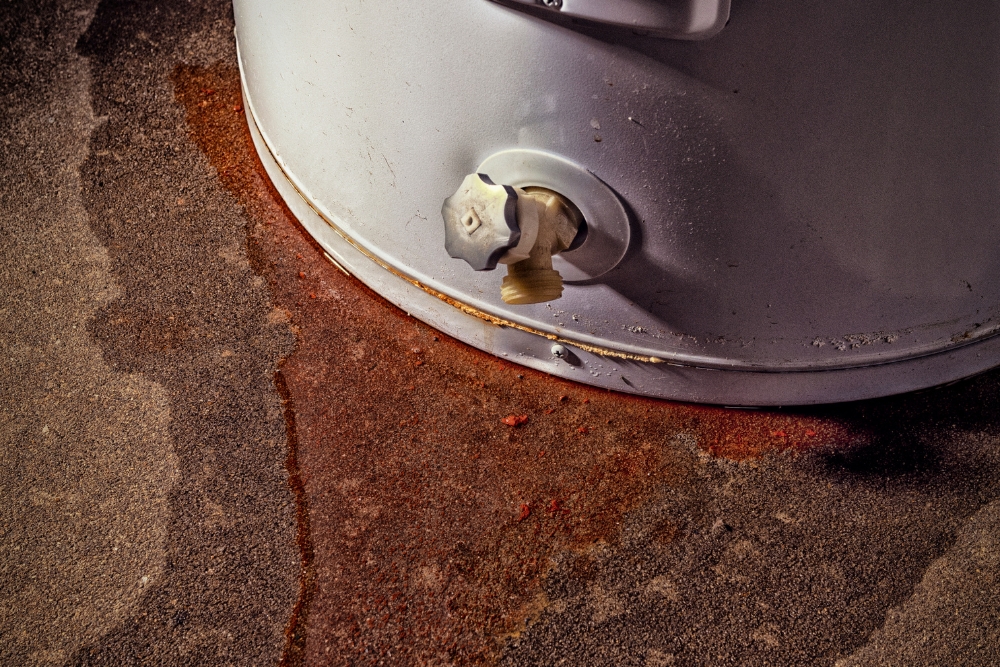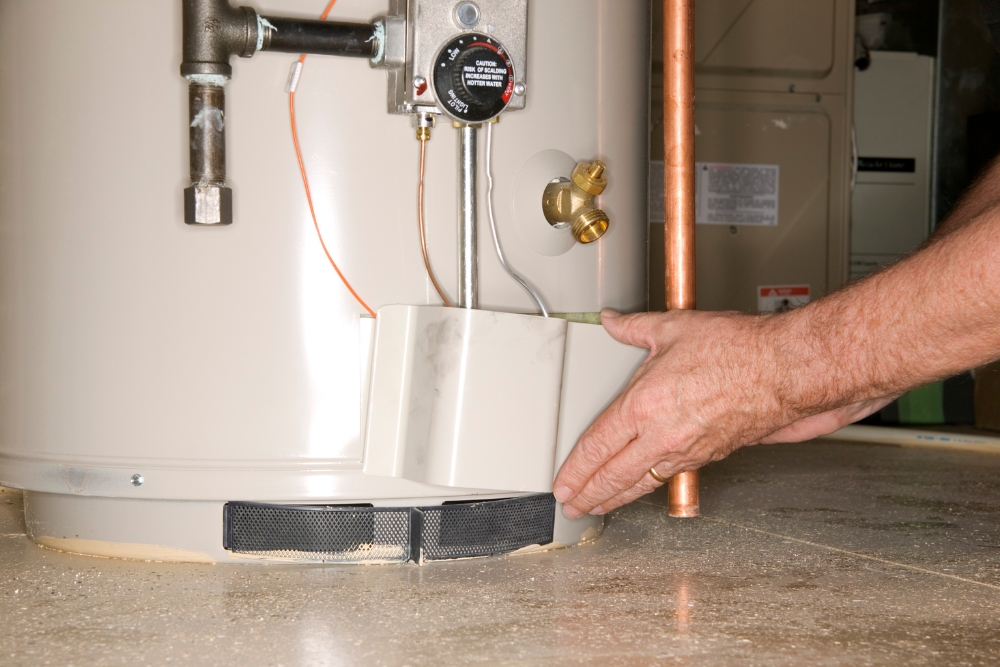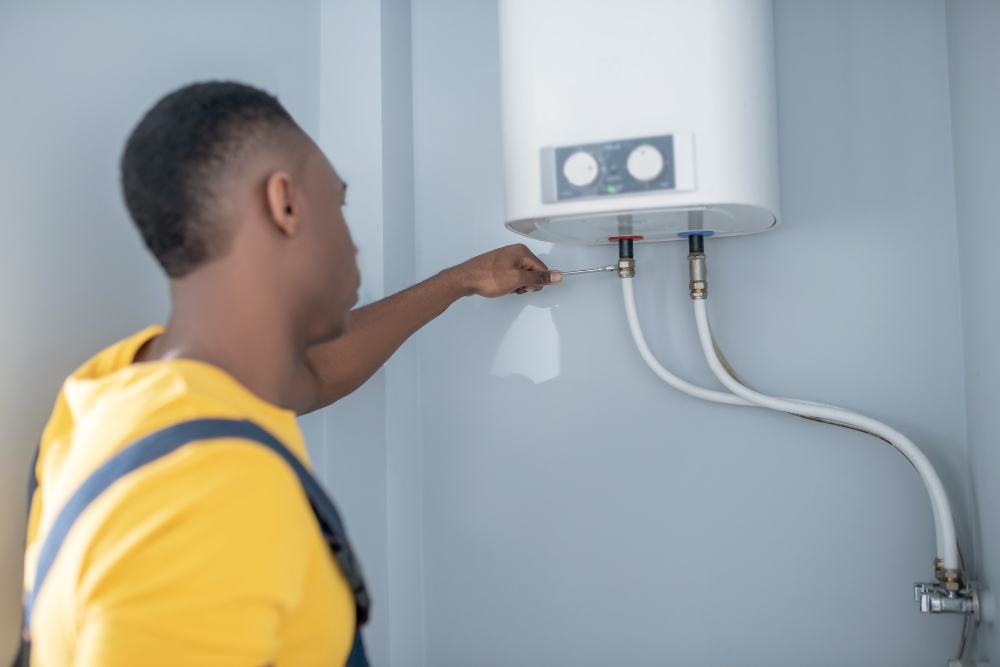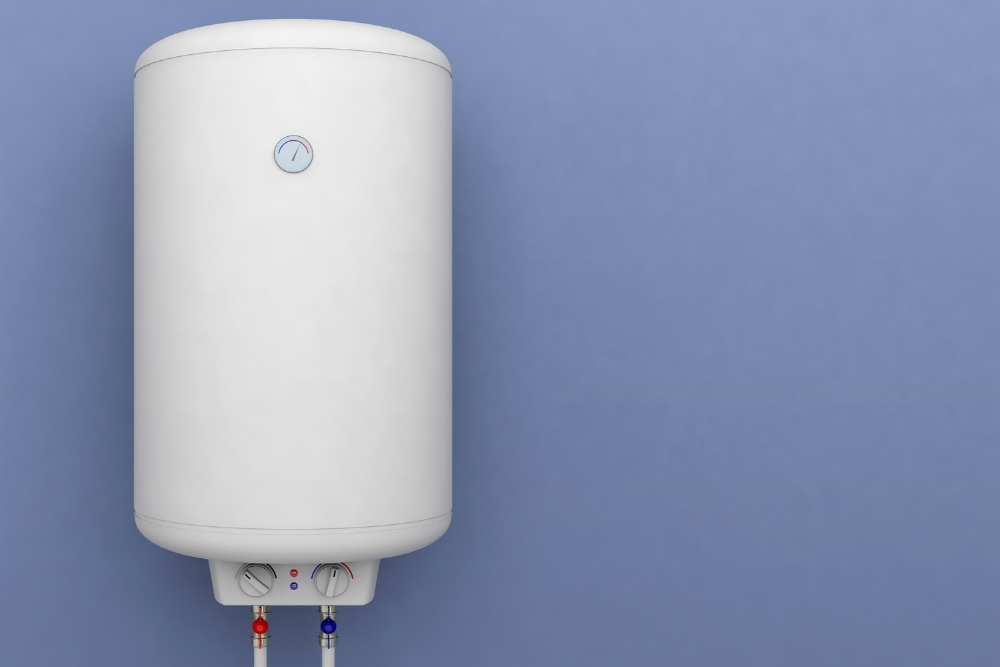Have you ever copped a chilly surprise when you were hanging out for a warm shower? Yep, it’s enough to make your heart skip a beat – and it usually points to your gas hot water heater chucking a wobbly.
But don’t worry, we’re going on the hunt for solutions that’ll bring back that comforting warmth in no time. Whether the pilot light’s gone walkabout or there’s some pressure playing up, we’ll shed some light on how you can suss out common hiccups without throwing in the towel.
So forget about shivering under that trickle of cold water; let’s crack into finding those steamy solutions!
Key Takeaways
- Performing regular checks and maintenance on your gas hot water heater can prevent many common issues such as pilot light failures, sediment buildup, and thermostat malfunctions.
- Becoming familiar with the parts of your gas hot water system like the burner, valves, and thermostat helps you troubleshoot problems quickly before they escalate.
- If the issue persists after basic troubleshooting steps like checking gas flow or cleaning filters, it’s essential to contact a professional plumber to diagnose and fix the problem properly.
- Always review your warranty details for coverage on repairs and replacements to avoid out-of-pocket expenses if your gas hot water heater encounters any defects or issues.
- Ensuring that all components are clean and in good working condition contributes significantly to having steady access to hot water while also prolonging the lifespan of your gas hot water system.

Understanding Different Types of Gas Hot Water Systems
When it comes to gas hot water systems, there are two main types to consider: instant gas hot water systems and storage gas hot water systems. Each type has its own set of unique features and potential issues that may arise, so it’s important to understand the differences between them.
Instant Gas Hot Water Systems
Instant gas hot water systems give us the convenience of immediate hot water, perfect for our busy lives. We revel in their efficiency and space-saving design. Sometimes, though, we might face challenges like a pilot light that refuses to stay lit or erratic water temperatures ranging from too hot to barely warm.
Low water pressure can take the joy out of our morning showers when it turns into a trickle instead of a strong flow. Such issues often stem from dirty burners, faulty igniters, or even a blocked cold water filter.
We diligently look for solutions as soon as these problems arise. A thorough check can reveal if there’s a problem with the electrical connections or perhaps a faulty flow sensor causing unexpected shutdowns during use.
Regular inspections are key; they help catch small problems before they become big headaches. Tending to maintenance ensures that gas is flowing correctly and all components are clean and properly connected—keeping that precious stream of hot water uninterrupted.
Moving forward, let’s delve into storage gas hot water systems and see how they compare with their instant counterparts.
Storage Gas Hot Water Systems
Storage gas hot water systems use a tank to store and heat water. These systems provide a constant supply of hot water, making them suitable for larger households with higher hot water usage.
Common issues with storage gas hot water systems include problems with the thermostat, sediment buildup in the tank, and corrosion of the tank or pipes due to aging.
Regular maintenance is crucial for ensuring the efficiency and longevity of storage gas hot water systems. Flushing out sediment from the tank, checking for any leaks or corrosion, and adjusting the thermostat settings can help prevent common issues.
It’s also important to check the warranty on your system and enlist professional plumbers when necessary to address any potential problems effectively.
Common Issues with Instant Gas Hot Water Systems
– Instant gas hot water systems can face issues like the pilot light not igniting, leading to no hot water.
– Some users may also experience lukewarm or sporadic hot water, as well as low water pressure with their instant gas hot water systems.
The pilot light not igniting
If you find that the pilot light on your gas hot water system is not igniting, it could be due to a variety of reasons. It’s essential to check if there is sufficient gas flow and ensure that the gas valve leading to the water heater is turned on.
Additionally, cleaning any debris or dust from the pilot assembly and ensuring that the thermocouple is properly positioned can help resolve this issue. If these initial troubleshooting steps do not solve the problem, it may be necessary to contact a professional plumber or technician who can diagnose and fix any underlying issues with the pilot light.
Remember that a faulty ignition system or a worn-out thermocouple are common causes for a pilot light not igniting on a gas hot water system. Regular maintenance and inspection of your water heater can help identify potential problems early on, preventing issues such as this from occurring.
Lukewarm or sporadic hot water
If you experience lukewarm or sporadic hot water, this could be due to issues with your gas hot water system. The most common causes include a faulty pilot light, low gas flow, or a malfunctioning thermostat.
It’s important to check if the water temperature is set correctly on the thermostat and ensure that the gas flow to the heater is sufficient. Additionally, sediment buildup in the tank can also lead to inconsistent heating.
Regular maintenance and periodic checks for sediment accumulation can help prevent this issue from occurring.
To troubleshoot lukewarm or sporadic hot water problems with your instant gas hot water system, start by checking the thermostat setting and ensuring proper gas flow. If these are not the culprits, consider examining any sediment buildup in the tank as it could cause irregular heating patterns.
Low water pressure
If you are experiencing low water pressure with your gas hot water system, it could be due to a variety of issues. Check for any blockages in the pipes or valves that may be restricting the flow of water.
Additionally, ensure that the cold water filter is clean and not obstructed, as this can also contribute to low water pressure. If you have an instant gas hot water system, a blocked strainer valve near the inlet could lead to reduced water flow and therefore lower pressure.
Regularly checking and cleaning these components can help maintain adequate water pressure from your gas hot water system.
Another potential cause of low water pressure could be a problem with the gas flow to the system. It’s important to make sure that the gas hot water system is receiving sufficient gas flow for optimal performance.
Troubleshooting for Gas Hot Water Not Working
To troubleshoot gas hot water not working, you can start by checking the gas flow and valve, examining the thermostat, restarting the water heater, and inspecting for any dirty burner or electrical connections.
If these steps don’t resolve the issue, there may be a more serious problem that requires professional repair.
Checking gas flow and valve
To ensure your gas hot water system is working properly, it’s important to check the gas flow and valve. Start by verifying if other gas appliances in your home are receiving adequate gas flow.

If not, there may be an issue with the overall gas supply that needs addressing. Next, examine the gas valve leading to the water heater to confirm it is fully open and allowing sufficient gas into the system.
A partially closed valve can result in inadequate heating performance or no hot water at all.
Checking thermostat
If you’ve ensured that there are no issues with the gas flow and valve, the next step is to check the thermostat. The thermostat controls the temperature of your hot water, so if it’s not functioning correctly, it can cause problems like lukewarm water or sporadic hot and cold water.
To troubleshoot this issue, firstly make sure that the thermostat is set to an appropriate temperature for your needs. If everything seems correct but you’re still experiencing problems, consider calling in a professional plumber to inspect and potentially replace the thermostat.
Regular maintenance and care for your gas hot water system can prevent potential issues from arising. By keeping an eye on your thermostat’s functionality, you can stay ahead of any problems that may occur with regulating your hot water’s temperature.
Restarting water heater
To restart the water heater, first, ensure that the gas supply valve is open. Then, locate the reset button on your water heater and press it to restart the unit. Allow it to run for a few minutes to see if this resolves the issue of lukewarm or sporadic hot water.
If not, you might need to check for any blockages in the cold-water filter or inspect the pilot light to ensure it is functioning properly.
If you continue experiencing problems after restarting your water heater, consider reaching out to a professional plumber for further assistance. Remember that regular maintenance can help prevent many common issues with gas hot water systems.
Checking for dirty burner or electrical connections
To ensure the smooth functioning of your gas hot water heater, it’s important to regularly inspect and clean the burner and electrical connections. Dirty burners can cause improper combustion, leading to reduced efficiency or even shutdowns.
Removing any dirt, debris, or soot from the burner assembly can help restore optimal performance. In addition, checking for loose or corroded electrical connections is essential as these can lead to intermittent power supply issues that affect the heater’s operation.
Regularly maintaining these components will contribute to a more reliable and efficient gas hot water system.
Inspecting for dirty burners and ensuring secure electrical connections are vital steps in safeguarding the functionality of your gas hot water heater. Proper maintenance of these components directly impacts its efficiency and reliability in providing consistent hot water.
Other Common Issues with Gas Hot Water Heaters
Water temperature problems can be caused by a faulty thermostat or sediment buildup in the tank. Dirty, rusty, or discoloured water may indicate corrosion or rust inside the tank. Leaking tanks, faulty valves, and pilot light trouble are also common issues that need immediate attention.
Water temperature problems
If your gas hot water system is not producing water at the right temperature, it could be due to a faulty thermostat or an issue with the gas flow. Checking the thermostat settings and making sure they are set correctly can help regulate the water temperature.
Additionally, ensuring that there is adequate gas flow to the water heater is essential for maintaining consistent hot water temperatures.
A dirty burner, improper installation, or sediment buildup in the tank can also lead to fluctuations in water temperature. Regular maintenance and cleaning of the system’s components can help prevent these issues and ensure that your gas hot water heater continues to deliver reliable and consistent hot water temperatures.
Dirty, rusty, or discoloured water
If your water temperature seems off, you may also notice the appearance of dirty, rusty, or discoloured water coming from the hot water system. This could indicate potential issues with your gas hot water heater.
Such discolouration can be caused by sediment buildup in the tank or corrosion within the plumbing lines. It’s important to address this issue promptly, as it not only affects the quality of your water but is also a sign that there may be internal problems with your hot water system.
Regular inspection and maintenance are crucial for identifying and addressing such underlying issues before they worsen. If you notice discoloured water, it’s advisable to consult a professional plumber to assess and resolve any potential problems with your gas hot water system promptly.
Leaking tank
When dealing with a gas hot water heater, another common issue to watch out for is a leaking tank. This can be caused by corrosion, loose connections, or a faulty temperature and pressure relief valve.
It’s important to address any leaks promptly as they can lead to further damage and potential flooding in your home.
Regularly inspecting the tank for signs of moisture or rust, checking the fittings and connections for any looseness, and ensuring that the temperature and pressure relief valve are functioning properly are essential steps in preventing a leaking tank.
Faulty valves
Faulty valves in gas hot water systems can cause a range of problems, including fluctuating temperatures, low water pressure, and even complete system shutdown. If you notice any irregularities in your hot water supply, it’s crucial to inspect the valves as they play a critical role in regulating the flow of water within the system.
The appearance of dirty or discoloured water could also indicate issues with the valves, signifying potential contamination or corrosion that needs immediate attention.
Regular maintenance and inspection are essential to ensure that the valves are functioning properly. A blocked strainer valve near the inlet valve may restrict proper operation and lead to various issues with your gas hot water system.
Moreover, faulty valves can significantly impact overall performance and efficiency which may result in increased energy consumption.
Pilot light trouble
If you’re experiencing pilot light trouble with your gas hot water heater, it could be due to a dirty or clogged pilot opening. Checking for any blockages and cleaning the area can help ensure that the pilot light ignites properly.
Additionally, make sure to inspect the gas supply to the water heater, as insufficient gas flow can also prevent the pilot light from staying lit. If you continue to experience issues with the pilot light after attempting these troubleshooting steps, it may be time to seek professional assistance.
Regular maintenance and inspection of your gas hot water system are essential in ensuring that potential issues like pilot light trouble are addressed promptly. Keeping an eye on the condition of the pilot assembly and maintaining proper gas flow can help prevent future problems from arising with your water heater’s pilot light.

Tips for Troubleshooting Your Gas Hot Water Heater
Regular maintenance is essential for keeping your gas hot water heater in good working condition. Checking the warranty and knowing when to call a professional plumber can save you time and money in the long run.
Regular maintenance
To keep your gas hot water system running efficiently, we recommend scheduling regular maintenance checks to ensure everything is working as it should be. Checking for any leaks, inspecting the burner and electrical connections, and cleaning or replacing filters will help prevent potential issues from arising.
It’s also important to check for any signs of rust or corrosion on the tank and valves, which could indicate a need for repairs.
Additionally, flushing out the tank periodically can help remove sediment build-up that may affect the performance of your water heater. Inspecting the pilot light regularly and keeping it clear of any debris is essential for maintaining proper ignition.
Checking warranty
Before attempting any repairs or maintenance on the gas hot water system, it is important to check the warranty. The warranty may cover certain issues and repairs, ensuring that you do not incur unnecessary costs for problems covered under the warranty.
If your system is still within the warranty period, contacting the manufacturer or installer can help determine if a particular issue falls under the warranty coverage.
Regular maintenance and prompt action on covered issues can ensure that your gas hot water heater continues to operate efficiently, saving you time and money in potential repair costs.
When to call a professional plumber
If you encounter issues with your gas hot water system that persist despite attempting the troubleshooting tips, it’s time to call in a professional plumber. Problems such as the pilot light not igniting, inadequate water temperature or persistent leaks are signs that require expert attention.
Additionally, if you notice discoloured water or fluctuations in gas flow across multiple appliances, seeking professional help is crucial. These skilled professionals have the knowledge and experience to diagnose and resolve complex gas hot water heater malfunctions efficiently.
When facing persistent issues with your gas hot water system, seeking out a trained plumber can save time and prevent further damage. They possess advanced expertise needed for effectively diagnosing and resolving intricate problems related to these systems.
Fast and Effective Hot Water Repairs in Your Area!
In conclusion, troubleshooting gas hot water heater issues is essential for maintaining a reliable and efficient system. Regular maintenance and inspection can help prevent potential problems from escalating.
Understanding common issues and following troubleshooting tips enables homeowners to address problems effectively. Checking gas flow, valves, and thermostats, and restarting the water heater are vital steps in addressing gas hot water not working properly.
When encountering persistent or complex issues, seeking professional plumbing assistance is recommended.
Facing issues with your gas hot water heater? Don’t let them linger! Our team at Hot Water Repairs Today specializes in troubleshooting and fixing gas hot water heater problems. Whether it’s a faulty pilot light, burner issues, or gas leaks, we have the knowledge and tools to diagnose and resolve the issue efficiently. Don’t risk your comfort and safety with a malfunctioning gas hot water heater. Contact us now to schedule a service and enjoy reliable hot water again.






